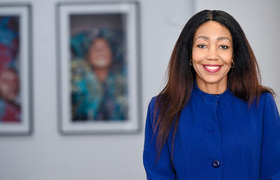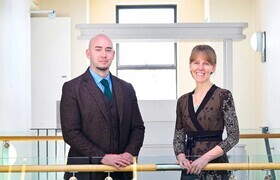Enhancing the good within UCT
03 October 2025 | Story Kamva Somdyala. Photos Lerato Maduna. Video Production Team Boikhutso Ntsoko and Kamva Somdyala. Read time 4 min.“We are about enabling institutional goals through the people of the University of Cape Town (UCT).”
These are the words from Executive Director: Human Resources (HR) Juliet Mhango, as she takes stock of her first 100 days in office. “We must make sure we are creating a conducive environment. The environment must allow people to flourish,” said Mhango. Once people feel they have adequate support, they will perform better, she commented.
“I’ve spent the last 100 days listening, as someone who comes from a different sector. And that’s been important. It’s been encouraging and I am really excited about how we are going to enhance the good that is within UCT,” she said. “There hasn’t been much time to reflect, and I’m excited about the opportunity to be here and make a difference.
“I’m born and bred in Tembisa, Gauteng. After graduating from Wits university [The University of the Witwatersrand], I began my career in human resources in earnest in 1998. The people, space and human resources have been close to my heart.”
Mhango brings over 25 years of experience in HR and has held senior leadership HR roles across several sectors, including healthcare, insurance, and telecommunications. Settling into the Western Cape three years ago was a “cultural shift”. “It’s been about establishing new connections and meeting new people since I got here.”
Thriving diversity
“For me, joining UCT was about purpose and meaning. What really attracted me to UCT was that at its core, it’s about its people, and I get to utilise my background and everything I know within the HR space and in leadership … UCT is an institution which is committed to excellence in teaching and research. UCT makes a social impact – including empowering our youth – and that aligns with where I am. It’s about making a difference.”
Within the university space, Mhango understands the social justice and transformation aspects which underpin much of the work that happens. “HR is a key component of that. We collaborate with the Office for Inclusivity & Change (OIC) so that we have a framework for the transformation agenda and strategy for the institution. Our people practices, which HR runs, have to enable the transformation agenda. Our policies and practices must create an environment for diversity to thrive.”
It is an exciting time in the people space since Vice-Chancellor (VC) Professor Mosa Moshabela requested feedback for Strategy 2030. The strategy was developed with input from the executive, and strategy process update presentations were conducted across the UCT community from April 2025 onwards and these continue to be shared across the community.
“We have started to look at what Strategy 2030 means for the people function.”
Staff, during times of feedback and stress testing organisational work, also need support. “With changes, it is important that communication is open and transparent and allows for staff to have a voice to influence the changes that come about.”
She added: “I like the approach the VC has taken in terms of the rollout of the strategy. All of us within our respective functions should also follow a similar approach. It [Strategy 2030] is for the people. Together with the HR team, we have started to look at what Strategy 2030 means for the people function. It goes beyond HR; it’s about people of the institution.”
The big focus for Mhango is the people’s strategy and how her team is reimagining the role of HR at the university. “Some of the themes coming about include employee well-being, which is about having a solid foundation in supporting our staff. There’s also a big focus on career development. We’re looking at transformation holistically and the Inclusivity Survey will give us further inputs into our people practices.”
 This work is licensed under a Creative Commons Attribution-NoDerivatives 4.0 International License.
This work is licensed under a Creative Commons Attribution-NoDerivatives 4.0 International License.
Please view the republishing articles page for more information.












